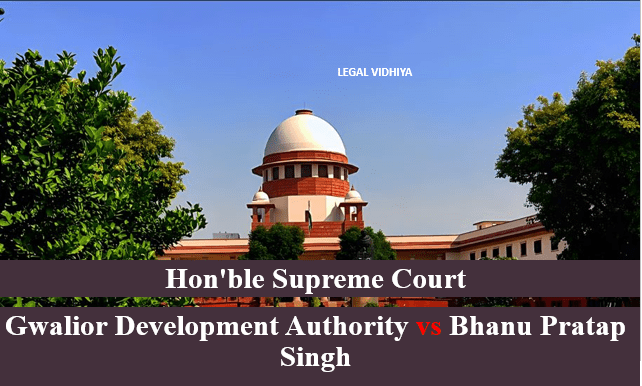
| Citation | Civil Appeal No. 8549 of 2014 |
| Case type | Civil |
| Appellant | Gwalior Development authority and another |
| Respondent | Bhanu Pratap Singh |
| Bench | Justice Ajay Rastogi & Hon’ble Ms.Trivedi |
| Court | Supreme Court of India |
| Date of Judgement | 16 April 2023 |
FACTS OF THE CASE
- The Supreme Court of India’s division bench decide precisely that in the recent case of Gwalior Development Authority vs. Bhanu Pratap Singh.
- Bhanu Pratap Singh took part in the auction held by the Gwalior Development Authority to lease plots. Being the highest bidder, the Gwalior Development Authority selected his bid. The authority gave him an allotment letter and required him to deposit the full bid amount within the allotted time frame; if he didn’t, his security deposit would be forfeited. Bhanu only deposited the money five years after failing to deposit the full amount on time. Surprisingly, the authority chose not to revoke the allocation or keep the security deposit. Rather, Bhanu was granted a lease for a lesser area of land. The Registration Act of 1908 was followed in order to properly register the lease deed. Three years later, Bhanu filed a writ of mandamus against the authority to execute the remaining portion of the lease deed with the Madhya Pradesh High Court.
- The authority was instructed to execute a lease deed for Bhanu Pratap for the remaining plot area after the High Court granted a writ petition. In addition, Bhanu was told to pay interest on the overdue installments. The authority contested the order, claiming that the transaction had finality and that the auction proceedings had ended with the execution of the lease deed. According to the authority, the lease deed was a straightforward business transaction, and Article 226 of the Constitution did not permit the directive to execute the remaining area without consideration. Bhanu contended that he was forced to use the High Court’s jurisdiction because the authority had executed the lease deed and had not taken further action to allocate the remaining area.
- The authority was instructed to execute a lease deed for Bhanu for the remaining portion after the High Court granted a writ petition.
ISSUE OF THE CASE
The contention of the case occurs on the ground where the respondent had no basis or excuse for initiating the transaction, which came to an end with the signing of the lease deed.
RELEVANT PROVISIONS
- Article 226 in The constitution of India ,1949
- Section 17 in The Registration Act,1908
- Article 14 in The constitution of India,1949
- Article 12 in The constitution of India,1949
JUDGEMENT
- The Supreme Court declared that the government’s indulgence constituted an obvious abuse of discretion and violated Article 14 of the Constitution. The transaction was completed on March 29, 2006, when the lease deed was signed without objection. The court came to the conclusion that the High Court could not change or amend a lease transaction once it was completed and registered.
- The Supreme Court has decided that because writ petitions are remedies under public law and not available under private law, they cannot be maintained to seek contractual relief. However, in contractual matters, exceptions might justify the use of writ jurisdiction.
REFERENCES
- https://ksandk.com/newsletter/gda-vs-bhanu-pratap/
- https://indiankanoon.org/doc/192794094/
This case analysis is prepared by Yashika Sain of LC-1, Faculty of Law, Delhi University
| Disclaimer: The materials provided herein are intended solely for informational purposes. Accessing or using the site or the materials does not establish an attorney-client relationship. The information presented on this site is not to be construed as legal or professional advice, and it should not be relied upon for such purposes or used as a substitute for advice from a licensed attorney in your state. Additionally, the viewpoint presented by the author is of a personal nature. |




0 Comments